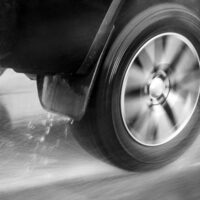Assessing Fault After A Hydroplaning Collision

Hydroplaning occurs when a vehicle’s tires lose contact with the road surface due to the water, which can result in the operator of the vehicle losing control. This type of collision can lead to accidents and injuries, and it can be hard to determine if an individual or several parties were at fault when inclement weather conditions (hydroplaning typically happens during heavy rain) were a contributing factor.
Seasoned Miami personal injury attorneys have handled numerous cases involving hydroplaning, so they are well versed in exploring the complexities of assessing fault in hydroplaning collisions. To have your case assessed, make an appointment with a Florida injury lawyer and discuss how fault will be determined after your car accident.
Insurance Company Assessments and Key Considerations
When it comes to insurance claims, the process of assessing fault in hydroplaning collisions varies as each insurance company typically conducts their own investigations. Their analysis will review all of the available evidence, such as police reports, witness statements, pictures, medical records, and other relevant information.
While insurance companies do consider weather conditions, they also look at the actions and behaviors of the drivers involved. In the state of Florida, drivers are expected to exercise caution and adapt their driving behavior if they are confronted with a challenging weather shift, so some considerations beyond weather that will be assessed include the following.
- Traveling speeds. Driving at excessive speeds in inclement weather is a known hydroplaning risk. If a driver is found to be speeding despite the adverse weather conditions, they may be deemed partially or fully responsible for the collision.
- Distance between vehicles. Maintaining a safe following distance is always important and especially so when traveling in wet conditions. In situations where a driver failed to maintain a reasonable distance from the vehicle ahead and subsequently collided when their vehicle began to hydroplaning, they could carry a level of responsibility.
- Tire maintenance. To stay safe when traveling by car, maintenance is essential as worn-out tires with insufficient tread depth can increase the chances of hydroplaning accidents. Drivers who travel in dangerous vehicles could be seen as an at-fault party.
- Negligent or reckless behavior. Sudden lane changes, aggressive braking, and distracted driving are dangerous behaviors and can contribute to accidents, including collisions related to hydroplaning.
It is important to note that what you believe happened may not always align with an insurance company assessment, but you do not have to accept an insurance adjuster’s initial viewpoint. With the help of a Florida injury lawyer, it may be possible to collect additional evidence that proves your right to a full and fair compensation amount.
Consult with a Hydroplane Accident Lawyer
Hiring a Miami personal injury attorney is an important step in protecting your rights and ensuring a fair assessment of liability. With their expertise, you can navigate the legal complexities and seek the compensation you deserve after a hydroplaning collision.
Is bad weather to blame for your accident injury? Bring the details you have to the attention of the legal team at Spencer Morgan Law. Call 305-423-3800 for a confidential assessment.
